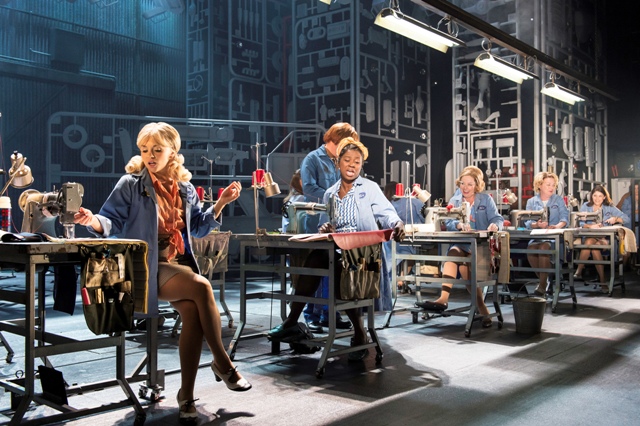Robert Tanitch reviews Made in Dagenham at Adelphi Theatre, London WC
In 1968 the female machinists, who were working in the Ford plant at Dagenham, went on strike for equal pay and caused a national crisis. The resilient women won. The Equal Pay Act was passed in 1970.
There are two ways you can do a strike on stage and film. You can do it seriously as John Galsworthy did with Strife (1909) Or you can do it satirically as the Boulting Brothers did in I’m All right, Jack (1958). You can also do it as a big glossy Broadway musical or you can do it as a gritty mini-agitprop piece and stage it on the Fringe.
Made in Dagenham (the 2005 film) was always in the same bracket as two other British films, The Full Monty (1997) and Billy Elliott (2000). So it is not surprising that somebody should want to do to it what was done to the other two and turn it into a feel-good British musical, even if it meant, like the other two, it was diminished.
Billy Elliott, which opened in 2005, is still with us. But The Full Monty, which did well on the road, folded after only five weeks in London. It will be interesting to see what happens to Made in Dagenham. The book is by Richard Bean. The music is by David Arnold. The lyrics are by Richard Thomas. The songs are not memorable
The director is Rupert Goold. Gemma Arterton heads a cast of resilient women and they include Isla Blair, Sophie-Louise Dann and Sophie Stanton.
Harold Wilson (played by Mark Hadfield) and the American executive (played by Steve Furst) from the Ford US head office are acted for broad, crude caricature, which means the story, a key battle in women’s rights is trivialized and is no more serious and emotionally involving than the strike in The Pajama Game (1954).
 There are two strike musicals waiting to be produced. There’s the American Newsies (about newsboys in 1889) which is on Broadway now and the British Matchgirls (about workers in Bryant and May factory in 1888) which has not had a major production since 1966 and might be a show for The Union Theatre or Southwark Playhouse.
There are two strike musicals waiting to be produced. There’s the American Newsies (about newsboys in 1889) which is on Broadway now and the British Matchgirls (about workers in Bryant and May factory in 1888) which has not had a major production since 1966 and might be a show for The Union Theatre or Southwark Playhouse.
To learn more about Robert Tanitch and his reviews, click here to go to his website





